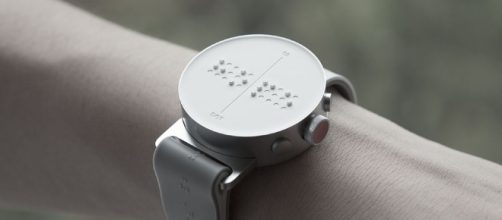Almost every form of technology around us has been built as an extension of our senses. Cars allows us to move faster, while smartphones allows us to see and hear people far away from us. The core function of technology is to allow us to explore functions and abilities that were previously unavailable to us. In this regard, a new smartwatch designed for blind people certainly resonates the core principles of creating technology.
A new turn for smartwatches
Eric Kim is the founder of The Dot Watch, a new revolutionary smartwatch that allows blind people to access information from their phones using braille.
He had the idea to develop this ingenious product when he noticed that one of his visually impaired classmates was being forced to carry around a large number of braille books around their campus.
The Dot Watch comprises of 24 touch sensors that utilize the help of electro-dynamic cells in order to relay information to the user in the form of braille. The braille library that is being built for this smartphone is already quite extensive and is being worked on every day. The watch has a radius of around 1.7 inches, a space that quite comfortably houses all the information relayed from a smartphone.
Built for functionality
This unique smartwatch is also equipped with a host of additional features such as an accelerometer, an alarm clock and a digital clock, and is capable of displaying information that has been synchronized with your social media platforms and your text messages.
Apart from all this, The Dot Watch is also compatible with your maps and GPS system, thereby helping you navigate using nothing but the smartwatch.
The accessory clearly has a vital place in today’s world, and the pre-orders certainly highlight that fact. So far, 140,000 units have already been requested from around the world, and the manufacturers claim that they are also working on various version of this product thanks to the 5 million dollars in investment they received recently.
The Dot Watch will be available in English and Korean from April, 2017, and will cost $290, an almost negligible price considering the convenience it offers for the visually impaired around us.

